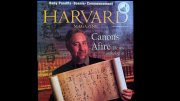"Works of art that we encounter aren't raw--they're cooked," says Stephen Greenblatt. "I'm interested in the cooking and what the ingredients were and where they came from." Greenblatt is a Shakespearean who has been called "easily the most prominent [Renaissance scholar] of his generation." Harvard wooed him for 10 years before he finally accepted a tenured professorship in the English department last year. He has dubbed his critical approach--which he downplays as merely a "way of thinking about literature in context," rather than a set of propositions or dogmas--New Historicism.
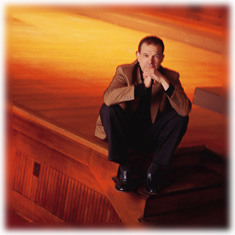
Professor of English and American Literature and Language
Don't try to pigeonhole him or his recently published Norton Shakespeare as New Historicist, though; Greenblatt takes evasive maneuvers. He sometimes refers to the movement in the past tense, as in "New Historicism was about trying to imagine and analyze works of art and literary art not as separate from the world that surrounds them, but as one kind of negotiation and exchange with the world." The impact of his approach within his field he attributes to the existence of "such a strong counterpoint for such a long time." The counterpoint is Harold Bloom, who would argue that great works of art are entirely transcendent: both of their own time and of ours. Greenblatt, on the other hand, says he is "interested in learning how all works of art relate to the historical and cultural and social world which they come from and which I come from. It's not just historical things," he says. "It's our own existence; what it means to be here now."
In its simplest expression, that means that in the Norton Shakespeare, of which Greenblatt is general editor, when Claudio in Much Ado about Nothing says he'd marry Antonio's daughter "were she an Ethiope," Greenblatt remarks on it with this footnote: "In other words, black, and therefore, according to the Elizabethan racist stereotype, ugly." Says Greenblatt, "Were she revealed to be an Ethiope means to an Elizabethan 'were she the most ghastly thing to marry imaginable.' Which I think is funny, because I think in our own aesthetic we regard Ethiopians as ravishingly beautiful." The footnote is just one of thousands written by Greenblatt and his fellow editors, but he cites it because, he says, it reflects a "combination of understanding something about the period--that black meant ugly--and understanding something about what our needs are. From our perspective, that's a racist stereotype." The Riverside Shakespeare doesn't footnote the word at all. "Maybe they thought it was a little embarrassing to notice it, that you might sound--I don't know--too politically correct," he says pointedly.
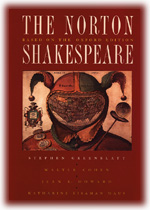 |
The Norton Shakespeare is not entirely Greenblatt's creation. It is based on the Oxford University Press edition that burst onto the scene in England, controversially, in 1986. What made the Oxford Shakespeare radical was its rejection of the centuries-old practice of silently stitching together discrepant versions of Shakespeare's plays. No manuscript in Shakespeare's hand is known to survive. Early printed versions of his plays often contain passages substantially different from one another. Hence, there is no authoritative or "master text" that could be regarded as a direct link to the author's pen. What editors since the eighteenth century have done is to weave together multiple versions of a play to create the "perfect" play they believe Shakespeare intended to publish, generally trying to include as much material as possible from all the available texts. The Oxford edition dispensed with these conflations. Its editors argued that the distinct versions were historical documents, that it was wrong to hide the fact that they were discrepant, and that to pretend one could recreate Shakespeare's ultimate intent was folly. Or more properly, they asserted that Shakespeare, a working playwright and actor by profession, never had an ultimate intent; he never finalized his plays because they were not intended to be published, only played on the stage, revised as the playwright and his fellow actors saw fit for performance. "It's very likely that Shakespeare himself was involved in the revision," says Greenblatt, "and even if he wasn't, these plays are the products, like plays now or like television shows, of elaborate social, collaborative enterprises--they're not the product of an artist in a garret somewhere scribbling this down for eternity."
The Norton Shakespeare is largely an improved Oxford edition with introductions, textual notes, and a glossary added to make the material more accessible to undergraduates. (Norton bought the English-language world rights to the Oxford text, but changes to the presentation had to be negotiated with the Oxford editors.) Unlike the Oxford edition, the Norton Shakespeare prints discrepant versions of King Lear on facing pages, so you can actually compare the texts line by line. (Hedging a bit, Greenblatt also includes a conflated version of Lear, edited by his Harvard colleague Barbara K. Lewalski, "so that students can see what that looks like," he says.) In presenting two versions of Hamlet, Greenblatt chose to indent the additional lines from one text within the body of the other, using a different typeface and numbering system to differentiate them. A few lines are necessarily repeated this way, "but what you gain," says Greenblatt, "is a remarkable sense of the differences between the two texts and what that means historically."
One change to the Oxford text that Greenblatt insisted on was the reinstatement of the name Falstaff for Prince Hal's boon companion; the Oxford edition calls him Sir John Oldcastle. The Oldcastle family, evidence suggests, brought pressure on Shakespeare to change the original character's name to Falstaff, and he did. "The Oxford editors are trying to save Shakespeare from the social process by which he made the name change," says Greenblatt. He argues that "the social negotiation has happened already and Shakespeare was part of it." If that weren't reason enough for saving Falstaff, there is the huge body of literary criticism, a rich web of allusion, and Falstaff's standing as "a character who, like Don Quixote, has taken on a life of his own in the culture," Greenblatt says.
Some scholars say that Greenblatt's critical approach can obscure the shaping role of the artist, so the whole idea of genius might appear antithetical to the New Historicist point of view. Greenblatt does seem a little uncomfortable talking about whether Shakespeare was a genius. "People do think that the idea of genius is contaminated itself," he says. "As a category of explanation, it tends to end the conversation rather than do much more." But then Greenblatt relents. A little. "Every once in a while, you do see somebody who is unbelievably good at this one particular game. I think that's manifest in this case here. He's not the only person who was good at it, and he wasn't good at it alone," Greenblatt says. "Somebody else was making the basketballs and someone made the court; the notion that this was all just done by one person is as silly as it would be to think that Michael Jordan created the NBA. He didn't. The game was in place."
"That's not to take away from Shakespeare," Greenblatt says. "It's just that anyone who has stuck his nose in the theater knows that it's only a puppet theater that involves one person, and even then someone had to make the puppets." In fact, Greenblatt's historically rooted approach sometimes leaves him "absolutely astonished" at how Shakespeare could have derived the play he wrote from its source materials. Othello, for example, despite having "lots of things that, correctly, should make one uncomfortable...is light years beyond the materials" Shakespeare was working with. "Far from collapsing Shakespeare and the play into one context," says Greenblatt, "it makes me feel a greater sense of wonder at what it means to take certain materials and fashion things out of them. But it's a wonder that I see coming from a very different place than if I hadn't had the historical work that I do." In other words, it's okay to talk about Shakespeare's genius as long as you know what you're talking about.
For some people, the question of genius is related to the question of Shakespeare's biography. There is a perception that we know very little about Shakespeare the man, that we know him principally through his plays. "Actually, we know a lot about him," says Greenblatt. "It's just that what we know is a little dull. They're the details of a fairly well-to-do bourgeois provincial. I regret that we don't have a lot more about Shakespeare, not because I think it could answer a lot of questions, but because it would teach us a whole bunch of other questions to ask."
The idea that someone other than Shakespeare wrote the plays is due at least partly to the tedium of Shakespeare's life as reflected in the historical record. But Greenblatt thinks he "can show very easily what kind of life experiences you could have" that would have allowed the playwright "to imagine the things he imagined. It's the wonder of the ordinary that Shakespeare is very, very good at getting," he says. "What it means to put on and take off clothes, what the tensions are between a husband and wife. Macbeth, full of witches, charms, and all sorts of weird things being thrown in pots, is actually most brilliant not about death, but what it means for a wife to say to a husband, 'Then you were a man, when you did this'--that form of sexual terrorism in ordinary, everyday, domestic life."
Greenblatt doesn't take theories of an alternative authorship very seriously. "They're largely focused on the tremendous anxiety that Shakespeare didn't go to Harvard, or some other university," and that he didn't have aristocratic blood, says Greenblatt. "It's a wacky perennial subject." He does, however, respond in an original way. He writes in his introduction to the Norton edition, "To integrate some of the probable circumstances of Shakespeare's early years with the particular shape of the theatrical imagination associated with his name, let us indulge briefly in the biographical daydreams that modern scholarship is supposed to have rendered forever obsolete. The vignettes that follow are conjectural, but they may suggest ways in which his life as we know it found its way into his art." The following example is titled "The Gown of Office."
Shakespeare was a very young boy--not quite four years old--when his father was chosen by the Stratford council as the town bailiff. The bailiff of an Elizabethan town was a significant position; he served the borough as a justice of the peace and performed a variety of other functions, including coroner and clerk of the market. He dealt routinely with an unusually wide spectrum of local society, for on the one hand he distributed alms and on the other he negotiated with the lord of the manor. More to the point, for our purposes, the office was attended with considerable ceremony. The bailiff and his deputy were entitled to appear in public in furred gowns, attended by sergeants bearing maces before them. On Rogation Days (three days of prayer for the harvest, before Ascension Day) they would solemnly pace out the parish boundaries, and they would similarly walk in processions on market and fair days. On Sundays, the sergeants would accompany the bailiff to church, where he would sit with his wife in a front pew, and he would have a comparable seat of honor at sermons in the Guild Chapel. On special occasions, there would also be plays in the Guildhall, at which the bailiff would be seated in the front row.
On a precocious child (or even, for that matter, an ordinary child), the effect of this ceremony would be at least threefold. First the ceremony would convey irresistably the power of clothes (the ceremonial gown of office) and of symbols (the mace) to transform identity as if by magic. Second, it would invest the father with immense power, distinction, and importance, awakening what we may call a lifelong dream of high station. And third, pulling slightly against this dream, it would provoke an odd feeling that the father's clothes do not fit, a perception that the office is not the same as the man, and an intimate, first-hand knowledge that when the robes are put off, their wearer is inevitably glimpsed in a far different, less exalted light.
 Stephen Owen |
The Chinese literary tradition is vast by comparison to our own. China's first anthology, The Classic of Poetry, was assembled during the Zhou dynasty (1020-221 b.c.), about two and a half millennia ago. Beyond this extraordinary history is the equally remarkable length of many works in Chinese. Several of the great plays, translated into English, are more than 1,200 pages long. The complete body of work is enormous, and the arduous task of translating this motherlode of cultural riches is the kind of endeavor one normally associates with eleventh-century monks working by candlelight. Yet Stephen Owen, a Harvard professor beloved of his students, recklessly backed himself into just such a project over an academic point. The result is the 1,200-page Anthology of Chinese Literature: Beginnings to 1911--another hefty offering from Norton--which he edited and translated himself.
"There are these clichés about translating poetry," the Conant University Professor explains. "One is that when you're reading poetry you're never really reading just the words and how well the words are [expressing a thought], you're reading them against everything else you've ever read." So, when people started asking him about the translation of poetry, he told them that the only way to do it right is to translate "the whole tradition. Out of that insight," says Owen, "you realize, yes, you can translate texts well if you translate enough of them, so that you create families of texts to play off against one another."
Colleagues call Owen a soaring and highly imaginative free spirit, comparing him to the eighth-century monk and calligrapher Huai Su and to the foremost Tang dynasty poet, the unfettered, convention-defying Li Bai, Huai's poetic peer. But Owen clearly also has an extraordinary capacity for hard work. He completed the monumental task of translation for the anthology over four summers, introducing new texts each fall to his Harvard course in Chinese literature. Then he watched how students responded. "If it didn't work," he says, "I threw it out." Gradually, drawing from the established Chinese canon, he built up a family of texts that he describes as a mediation between what the Chinese see as Chinese literature and what works in English. Creating the whole anthology himself, he says, was "not so much ambitious as mad--not so much about me, but [about sharing] my understanding, informed by having read a lot of Chinese writing about their literature and what they value, and by dealing with students. It's a case of listening to others," says Owen. "In that sense, it's probably the most pragmatic anthology ever done."
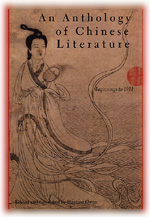
|
Critics of Owen's plan to translate the entire anthology solo charged that the variety of voices would be lost when one man translated the work of many poets across millennia. Owen disagreed. "I thought of myself as writing a drama," he says, "a huge play. If you're writing a play, you don't make one person sound like another! You create a family of different characters who become interesting in relationship to one another." Owen has been teaching some of the poets for 25 years, so that, he says, "Every time I teach them in Chinese, I hear them in English in the back of my head. They have become characters I know."
There are advantages to doing all the work oneself. For example, says Owen, "if a poet writes something in the third century b.c., and someone in the eighteenth, nineteenth, and seventeenth century quotes it, I've got it verbatim. If someone plays on a phrase, it's verbatim. If you change a metrical style by certain conventions, you can tell the metrical style changed. There are all sorts of ways--if you are doing it yourself rather than with a group of people--that you can integrate the tradition and make differences coherent." Thus the phrase "sunlight circling dragon scales," from Du Fu's circa a.d. 767 Tang dynasty poem "Autumn Stirrings," reappears in precisely the same words when the eunuchs sing the emperor's praises in the "Declaration of Love" from Hong Sheng's Qing dynasty play The Palace of Lasting Life, written almost a thousand years later.
Thousand-year-old allusions, virtually impossible in English because of changes in the culture, are not uncommon in Chinese, with its continuous, nearly 3,000-year-old literary tradition. "Unlike the Chinese, we live in a culture of supercession," says Owen. "What we did in the '80s is no longer what we do in the '90s--when something new comes in, it replaces something old. But up until the twentieth century, the Chinese culture was one of accretion. New things were always happening--the Chinese just didn't forget anything old."
"The Chinese have a very different relationship with the past," says Owen. A case in point: When the anthology first appeared, Owen received "a wonderful letter from a gentleman who was a descendant of the Song lyricist Qin Guan," from whose poetry Owen had included just one example. "This man was very upset that I had not included more of his ancestor's poems," says Owen. What is remarkable about this family partisanship is that Qin Guan was writing in the eleventh century. Where the family line is concerned, "They're not kidding," Owen says, citing a recent Taiwanese case in which a man sued, successfully, for defamation of an eighth-century ancestor.
In the Chinese written tradition, new literary forms were added constantly to those still in use, creating a rich field of possibilities. Many of the allusions, stories, and poems that are part of the shared cultural repertoire come from the early period. Owen likes to tell his students how Mao Zedong kept a court poet who, when he wrote a "happy birthday" poem to the Communist chairman, rhymed the word "Moscow" using Tang dynasty, rather than modern, rhymes.
Perhaps even more surprising is the fact that a modern reader of classical Chinese can look at something written 2,000 years ago and not find the language strange. This is not the case in English, in which the language of Beowulf, or even Chaucer's Canterbury Tales, is quite unlike its modern descendant. "In Chinese, it doesn't matter whether this is 1,000 b.c. or a.d. 200," Owen says, "because the culture is all one big room, with far less alienation between the past and the present than we have. When [Chinese president] Jiang Zemin wants to talk about his hatred [of Japanese invaders], for example, he does so through allusion to the Nan Lushan rebellion, which happened in a.d. 755," says Owen. "It's a way of thinking about the present with these past texts."
Fewer Chinese texts have been lost than one might guess, largely because China discovered printing in the ninth century. By the eleventh century, the country had a flourishing commercial printing industry. Ask Owen about the significance of Gutenberg, and his face lights up: "The significance of Gutenberg is that it happened in the West," he says with a puckish grin. The Chinese even had movable type before Gutenberg, according to Owen, but generally carved whole pages of characters because that was more practical.
Despite the good-natured jab about Gutenberg, Owen's aim in the anthology is not to subvert Western notions of cultural primacy, but simply to make Chinese literature part of American culture. "There are lots of Chinese in the United States," Owen points out, "and their children will be culturally American. A good number of these children will marry non-Chinese. Their children's children will marry non-Chinese, probably, and so on. It's a good old American story." What is now an ethnically separate group, often culturally distinct from the mainstream of America, will no longer be so in a hundred years. After all, says Owen, looking to the past for analogies, a hundred years ago "an Irish student did not come to Harvard. Irish culture was not really considered part of European culture. Dante was read by intellectuals, but was generally considered too papist. American culture was essentially West European Protestant. Now an Irish immigrant's son sits in a Harvard lecture hall and is told that Shakespeare is his culture, Dante is his culture, that there's this one thing we call Western culture. And the Irish student belongs to that, and we take that so much for granted that we forget that it wasn't so long ago that the definition of what American culture was did have some rather radical exclusions. People look at me when I say this, but I think that in a hundred years the definition of American culture is going to be, again, much broader--not artificially multicultural in any sense, but just taken for granted that 'Yes, there's all this great stuff, and it's all part of our background.'"
If all those marriages that Owen is anticipating do take place, Chinese culture will be a part of every American's background. Everybody will have a Chinese great-grandmother or great-grandfather. And we'll all have Owen to thank for having seen our cultural baggage safely through customs.
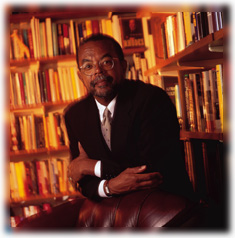 Henry Louis Gates Jr. |
Henry Louis Gates understands that the power to make things happen resides in people, and he is a master at assembling them. Take Harvard's Afro-American studies department, of which he is the chairman. Since his arrival in 1991, when the department was small and struggling, Gates has attracted some of the country's most celebrated black scholars to the Harvard faculty. People sat up and took notice of this critical mass. Now, with the Norton Anthology of African American Literature, Gates has repeated that formula. He and fellow general editor Nellie Y. McKay, professor of American and Afro-American literature at the University of Wisconsin, Madison, chose nine scholars to act as period editors, "people whose judgment we trusted, and indeed, admired," says Gates. These nine wrote the introductory essays to each of the seven sections, selected the works, and provided explicative notes. "We were making a pioneering statement about the field," Gates says, "and I wanted to democratize that process as much as possible, so that's why I invited so many people to be editors." Of course, this volume is not the first anthology of African-American literature, but it is the first to bear the Norton imprimatur. That means it will reach a broad market of schools and colleges, an important consideration to Gates, who says, "I'm concerned with institution building."
The anthology begins with a section devoted to the vernacular tradition: spirituals, folktales, sermons, gospel, work songs, blues, jazz, even rap. Some of these works may be heard on a companion audio CD (a first for Norton), including jazz by Duke Ellington and Louis Armstrong, the powerful oratory of Martin Luther King Jr. and Malcolm X, and the rap of social dislocation as performed by Grandmaster Flash & the Furious five. The other six sections of the anthology are arranged chronologically, and include notable firsts such as Lucy Terry's "Bars Fight" (1746), the earliest known poem by an African American; Victor Sejour's The Mulatto (1837), the earliest short story by an African American, published here for the first time in English; and selections from Harriet Wilson's Our Nig (1859), the first African-American novel. And because "so much of the very best writing has emerged only since 1950," Gates says, there are also many relatively recent works by authors still living.
Had Norton gone looking for someone to edit an anthology of African-American literature, Gates would have been a logical choice. But Gates approached Norton, not the other way around. The idea had been evolving in his mind, he says, since his days as a graduate student at the University of Cambridge, in 1973 and 1974, when his supervisor, Wole Soyinka, was preparing an anthology of poems from black Africa for publication. Twelve years later, while teaching at Cornell, Gates found he was a neighbor to M.H. Abrams, "the godfather of Norton anthologies," as Gates calls him; Abrams edited the first Norton Anthology of English Literature, published in 1962. "You didn't have to be a rocket scientist to put two and two together," says Gates, who spent from 1985 to 1987 selling his idea to W.W. Norton, persuading them that they could sell the requisite 30,000 copies a year to students of the 600 people who teach African-American literature courses in this country. "I had to be optimistic and say 'Hey, this thing will sell like crazy,'" says Gates, "but not even I, in my wildest dreams, believed that it would sell like it sold." In Boston, in fact, the anthology sold out. That was in December of 1996, and the attorney general of Massachusetts called Gates in search of two copies to give as Christmas presents. "He wasn't the only one," according to Gates, who reports that Norton sold 72,717 copies in 1997.
The details of editing and publication are of less concern to Gates than the act of publishing itself. "The process of canonization is absolutely necessary, it's rock bottom, it's fundamental," he says. He recalls that many of his deconstructionist colleagues at Cornell said, "Why do such a retrograde thing? We're busy trying to explode the notion of canon formation." Gates doesn't buy those arguments, recalling that in 1976, at Yale, he had to teach Zora Neale Hurston's novel Their Eyes Were Watching God from photocopies because it was out of print. "I want it to be impossible for anyone, anywhere, to say they can't teach African-American literature because the texts aren't available," he emphasizes. Yet Gates, remembering that in the 1960s "you could publish anything black," is wary of the current burst of enthusiasm and commercial support for the publication of books by black authors. He attributes the anthology's success to its novelty, to "the growing fascination of the traditional readership--that is, middle-class white people--with black writing," and to the "hunger of the new black middle class for work about themselves."
What follows is an abridged excerpt from Gates's introduction to the anthology.
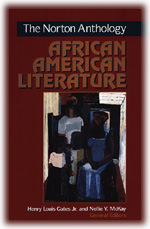 |
In the history of the world's great literatures, few traditions have origins as curious as that created by African slaves and ex-slaves writing in the English language in the third quarter of the eighteenth century. In the stubbornly durable history of human slavery, it was only the black slaves in England and the United States who created a genre of literature that, at once, testified against their captors and bore witness to the urge to be free and literate...
African American slaves, remarkably, sought to write themselves out of slavery by mastering the Anglo-American belletristic tradition. To say that they did so against the greatest odds does not begin to suggest the historic proportions that the task of registering a black voice in printed letters entailed. James Albert Ukawsaw Gronniosaw, the author of the first full-length black autobiography, A narrative of the most remarkable particulars in the life of James Albert Gronniosaw, an African Prince (1770), and the source of the genre of the slave narrative, accounted for this animosity, as well as the slave's anxiety before it, in the trope of the talking book:
[My Master] used to read prayers in public to the ship's crew every Sabbath day; and then I saw him read. I was never so surprised in my life, as when I saw the book talk to my master, for I thought it did as I observed him to look upon it, and move his lips. I wished it would do so with me. As soon as my master had done reading, I followed him to the place where he put the book, being mightily delighted with it, and when nobody saw me I opened it, and put my ear down close upon it, in great hopes that it would say something to me; but I was sorry and greatly disappointed, when I found that it would not speak. This thought immediately presented itself to me, that every body and every thing despised me because I was black.
The text of Western letters refused to speak to the person of African descent; paradoxically, we read about that refusal in a text created by that very person of African descent. In a very real sense, the Anglo-African literary tradition was created two centuries ago in order to demonstrate that persons of African descent possessed the requisite degrees of reason and wit to create literature, that they were, indeed, full and equal members of the community of rational sentient beings, that they could, indeed, write. With Gronniosaw's An African Prince, a distinctively "African" voice registered its presence in the republic of letters; it was a text that both talked "black," and through its unrelenting indictment of the institution of slavery, talked back....
[Today,] African American literature has been enjoying a renaissance in quality and quantity for the past decade or so, even vaster than the New Negro, or Harlem, Renaissance of the 1920s, spurred on to a significant extent since 1970 by the writings of African American women such as [Toni] Morrison, Alice Walker, Maya Angelou, Rita Dove, Gloria Naylor, Jamaica Kincaid, and Terry McMillan, among a host of others. The number of literary prizes won by black authors in the past decade, including Pulitzer Prizes, National and American Book Awards, far exceeds the total number of such honors won by African Americans during the rest of the century. And several times since 1990, as many as three or four black authors have appeared simultaneously on the best-seller list of the New York Times. While the audience for this magnificent flowering of black literature crosses all racial boundaries, black readers have never been more numerous: in June 1996 the Times reported that African Americans purchase 160 million books a year.
Jonathan Shaw '89 is an associate editor of this magazine.
